Jeddah , SAUDI ARABIA :
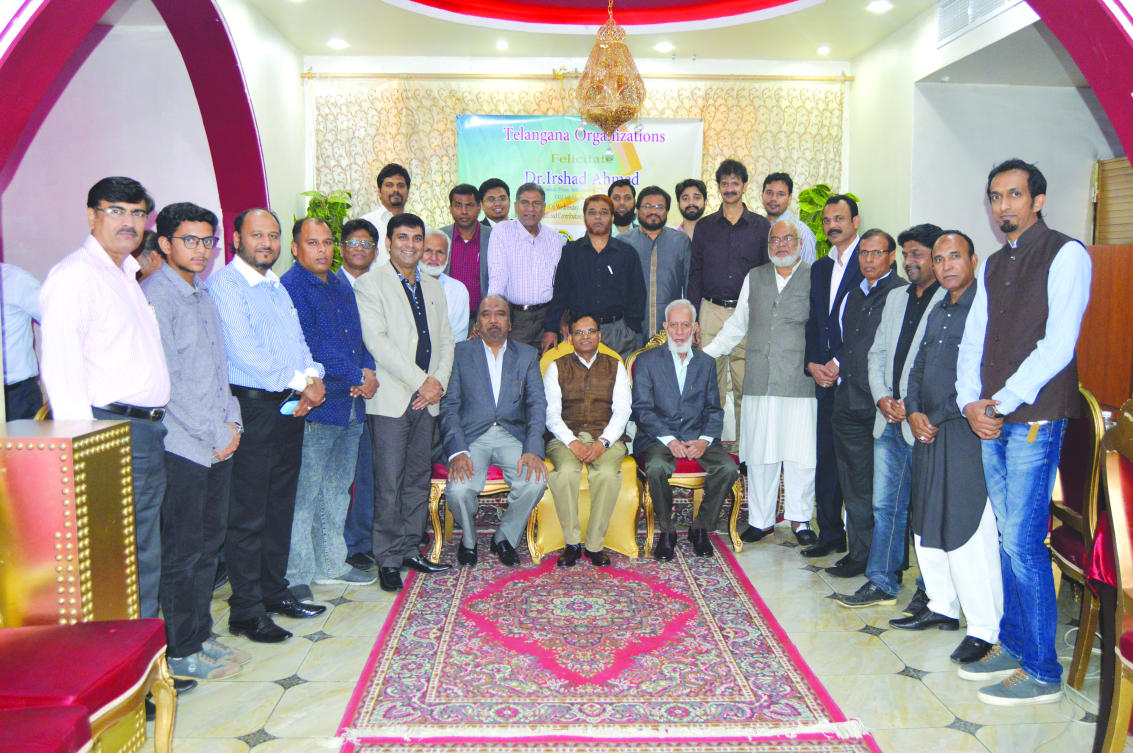
Jeddah , SAUDI ARABIA :

Mysuru, KARNATAKA :
Karkala (Udupi District), KARNATAKA / Doha , QATAR :
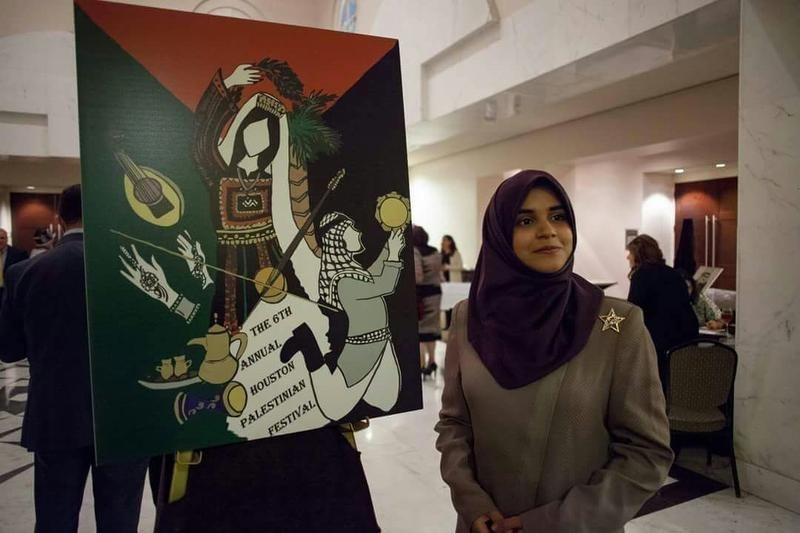
Udupi:
A Non-Resident Indian student, Wafa Sultana 23 from Karkala and currently staying in Doha to pursue her Master’s in Gulf Studies at Qatar University, got international recognition for her artwork on Palestine.
She won because her work best represented Palestinian culture and heritage. Every detail represents something about its people and culture.
Wafa told STOI: “The Palestine American Cultural Centre (PAAC) promotes cultural and humanitarian programmes which highlight the rich heritage of Palestine. They organised a poster-making competition, inviting people to create art that promotes Palestinian people and culture. During my trip to Texas, I met a few Palestinian students who studied in universities there and they told me about the competition. I consider myself a global citizen and this inspired me to do this artwork. I believe in learning more about people and cultures across the world. The more you learn about another’s culture , the more you learn to respect them.”
“I only knew Palestine as a state going through a tough phase. But this competition led me to look beyond the politics. To do artwork reflecting their culture, I had to know more about their food, language, religion, literature, music, clothing, etc. Fellaheen or a village woman wearing the traditional Palestinian dress with unique embroidery work with a white, flowing veil is exquisite,” she said.
“For me, this was not only an informative experience but also shattered many faulty generalizations and stereotypes. I learned the more you travel or read, the more you begin to celebrate diversity and realize you’re part of a big, world family. My artwork comprises a Palestinian man doing a ‘dabke’ move with a tambourine. There are musical instruments like the Kamanjah, Oud and Derbekkeh on my painting. I also drew a ‘Dallah’, a traditional Arab coffee pot and there’s the Palestinian flag in the background,” she added.
She wants to work towards peace and communal harmony by spreading the message of secularism, pluralism and beauty of diversity through her artwork. “I want the Indian civil society to rise above divisive politics of hate and religion and work towards national progress, fighting against our common enemies of poverty and corruption,” she said.
Wafa is the second daughter of Mohiddin and Humara of Karkala taluk. She did her PU at St Aloysius College and LLB at SDM, Mangaluru. She stopped her studies during fourth year of the law course as she was married to Shaik Afzal, a chemical engineer. After marriage, he went to the US for his doctoral studies. Wafa finished her LLB at Al Ameen College, Bangaluru and then moved to Qatar for the Master’s course.
Hamaira said, “I have four children. The eldest girl is a doctor and lives in the US. The son is doing journalism and the youngest daughter is doing dental undergraduate course. I’m very happy my daughter has got international recognition for her artwork.”
source: http://www.timesofindia.indiatimes.com / The Times of India / News> City News> Mangalore News / TNN / November 20th, 2016
Bugrasi (Bulandshahr), UTTAR PRADESH :
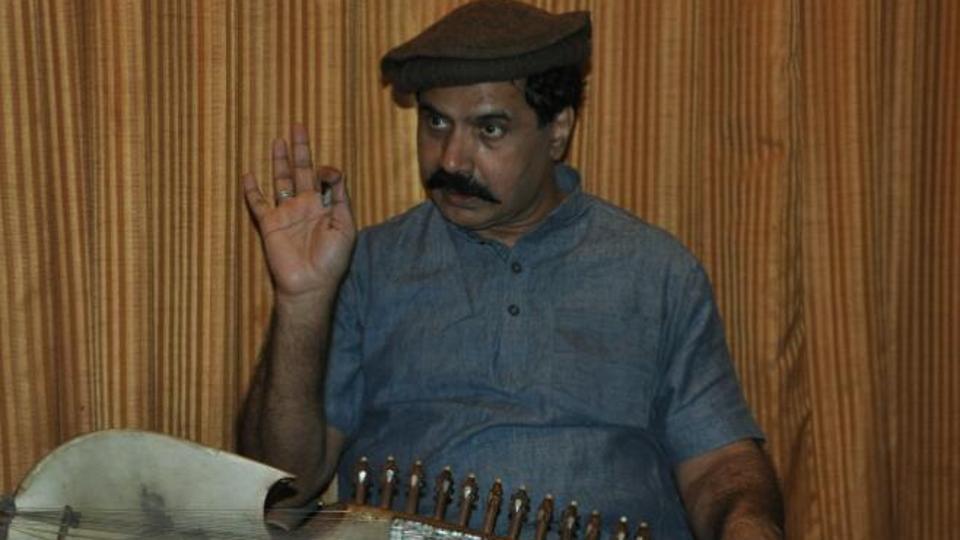
Music transcends borders and captivates hearts. Going by this maxim, India’s noted rabab exponent Gulfam Ahmad Khan, 61, is a winner all the way, from India to Afghanistan.
Khan, who played the Afghan rabab at Sankatmochan Sangeet Samaroh here late Saturday night and left the audience spellbound, has become India’s ambassador of goodwill of sorts in Afghanistan.
In Afghanistan, he teaches locals the rudiments of playing the lute-shaped musical instrument which is quite akin to the sarod.
Khan, who divides his time between New Delhi and Kabul, has taught 250 Afghan nationals and 50 more are under his tutelage. His skill has earned him enormous respect in Afghanistan where people call him Ustad.
In particular, he wants to popularise the Dhrupadi rabab (Narad veena), an Indian variety of the instrument, across Afghanistan and in other parts of the world.
Khan wishes for Prime Minister Narendra Modi to take the initiative to popularise the Indian rabab.
“Dhrupadi rabab is a completely classical instrument. It produces spiritual tunes. The Afghan rabab is for fast tunes. The Indian rabab needs promotion and preservation. If the centre makes a little effort, it may become a highly popular instrument in Afghanistan,” Khan told HT.
Khan , who is in Varanasi on a four-day tour, will leave for New Delhi on Monday.
Born in Bugrasi, a town in Bulandshahar, he started playing the rabab with his father Ishtiyaque Khan who had mastery over both rabab and sarod. He gave his first performance at the age of nine in Gurudaspur.
After putting in hours of riyaaz (practice), he honed his skills.
A few years later, he performed in Ahmedabad and did not have to look back thereafter.
He took a break for a few years in the late 198os when there were no connoisseurs of the great art. During this period, he played the sarod, only to return to the rabab in the 1990s.
Starting a fresh innings, he gave a few public performances and wrote the popular number ‘Gata jaaye mast kalandar, Allah teri shan, Maula teri shan’, composing the music on the rabab.
The song made him popular across Punjab.
When he visited his daughter and son-in-law in Afghanistan, he played the rabab and impressed the locals there. Many of them insisted on learning to play the rabab from him. He did not refuse.
As his renown reached the Indian embassy in Afghanistan, senior officials invited him to hold classes on the rabab to the Afghan people. Shedding his initial reluctance, he eventually accepted the offer.
He remained in Afghanistan between 2009 and 2014, training many locals. He also learned some local songs.
“Over 250 Afghans learned to play the rabab in my classes. Some of them are professional rabab players. Around 50 Afghans still take tips from me,” he said.
“Performing at the Sankatmochan Hanuman Temple is a spiritual experience. The audience enjoyed my performance. I will keep coming here. Banaras is a great city and its culture is really fabulous,” he told HT.
After putting in hours of riyaaz (practice), he honed his skills.
A few years later, he performed in Ahmedabad and did not have to look back thereafter.
He took a break for a few years in the late 198os when there were no connoisseurs of the great art. During this period, he played the sarod, only to return to the rabab in the 1990s.
Starting a fresh innings, he gave a few public performances and wrote the popular number ‘Gata jaaye mast kalandar, Allah teri shan, Maula teri shan’, composing the music on the rabab.
The song made him popular across Punjab.
When he visited his daughter and son-in-law in Afghanistan, he played the rabab and impressed the locals there. Many of them insisted on learning to play the rabab from him. He did not refuse.
As his renown reached the Indian embassy in Afghanistan, senior officials invited him to hold classes on the rabab to the Afghan people. Shedding his initial reluctance, he eventually accepted the offer.
He remained in Afghanistan between 2009 and 2014, training many locals. He also learned some local songs.
“Over 250 Afghans learned to play the rabab in my classes. Some of them are professional rabab players. Around 50 Afghans still take tips from me,” he said.
“Performing at the Sankatmochan Hanuman Temple is a spiritual experience. The audience enjoyed my performance. I will keep coming here. Banaras is a great city and its culture is really fabulous,” he told HT.
source: http://www.hindustantimes.com / Hindustan Times / Home> Cities> Lucknow / by Sudhir Kumar, Varanasi, Hindustan Times / April 17th, 2017
Srinagar, JAMMU & KASHMIR :
Srinagar
Hyderabad, TELANGANA :
Starts academy for players between ages three and eight.
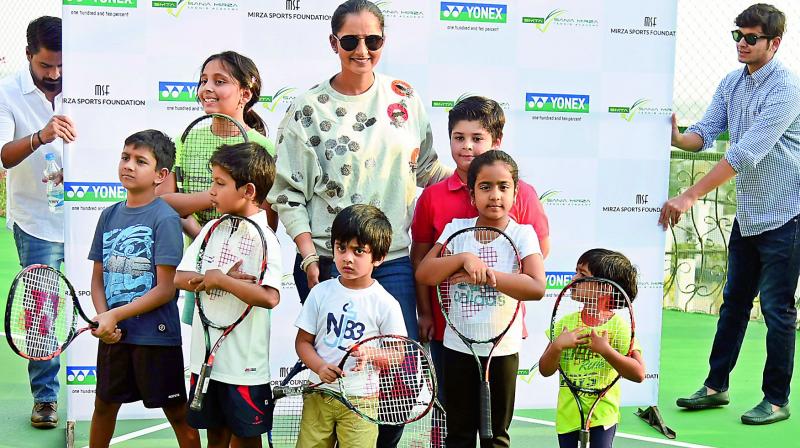
Hyderabad:
Tennis ace Sania Mirza on Monday launched the Sania Mirza Tennis Academy’s Grassroot Level wing for players between the ages of three and eight, next to her home in Jubilee Hills here.
The idea was to introduce budding players to tennis, she said. “As a tennis player I’ve had lot of difficulties coming to know what to do and where to go as a child and knowing how much to practise,” Sania said.
“It is actually my mother and her friend’s idea and obviously the Mirza family supports it. Tennis today is too competitive and you have to start when you are three or four years old,” Sania explained. “The professionals, the biggest of champions, have always started at the ages of 4, 5 and 6,” she added.
“We are still waiting for the next Sania, the next Mahesh (Bhupathi) and Leanders (Paes) to come and this is just a small way of contributing to it,” she said adding “It is right next to my house and I will obviously give some time as well.
“The concept is to get as many kids as possible to the academy where we are going to play with soft, colourful balls to make it attractive and easier for them,” Sania said, adding, “At that age, I don’t think they’d understand the concept of forehand or backhand. It is more about fun, enjoyment. You have to get them to try and love the game first before they want to actually make it their profession.”
source: http://www.deccanchronicle.com / Deccan Chronicle / Home> Sports> Tennis / February 07th, 2017
Srinagar, JAMMU & KASHMIR / Mumbai, MAHARASHTRA :
Actress Hina Khan, who is known for her iconic performance of Akshara on the show Yeh Rishta Kya Kehlata Hai, recently visited the Ajmer Sharif Dargah.
She played the character of Akshara, a lady who was very homely and sanskari. Hina was praised for her performance multiple times. She had become the face of Yeh Rishta Kya Kehlata Hai and made the show popular. For more that 8 years, the actress entertained the audience and got immense love in return.
She recently quit the show and is currently on a break. The actress is spending her time with her close friends and is visiting a number of places. She offered prayers at the Ajmer Sharif Dargah and shared the following post on her social media handle.
Hina has also been in the news as there are rumors about her taking up Nach Baliye with rumored beau Rocky Jaiswal.
source: http://www.timesofindia.indiatimes.com / The Times of India / Home> News> TV> News> Hindi / TNN / February 20th, 2017
NEW DELHI :
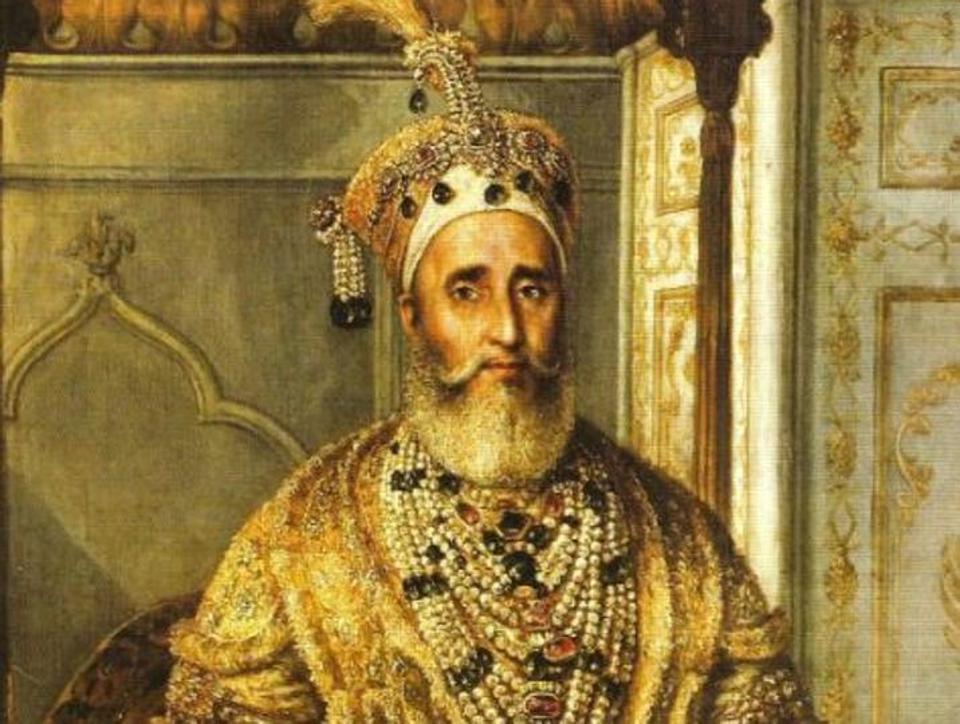
A new book brings alive the life and poetry of the last Mughal Emperor Bahadur Shah Zafar as author Aslam Parvez weaves together the strands of the political, the personal, the cultural and the literary aspects of a bygone era.
Publisher Hay House describes The Life and Poetry of Bahadur Shah Zafar as an absorbing, authentic and exemplary chronicle — studded with rare nuggets of information and enthralling anecdotes — of one of the most tragic figures of history who was witness to the end of a glorious dynasty.
First published in Urdu in 1986, this book brings alive the life and poetry of Zafar (1775 to 1862), who presided over a crucial period in Indian history when the country was subjugated and became a colony of the fast-expanding British Empire.
This work is as much about the 1857 Rebellion as it is about Zafar, the reluctant leader of the rebels. The pages also evoke the captivating ambience of a period when formidable poets such as Mirza Ghalib, Sheikh Muhammad Ibrahim Zauq and Momin Khan Momin, apart from Zafar himself, came up with one creative gem after another.
The author also provides a vivid picture of Delhi during the last days of its cultural and literary splendour as the Mughal capital and as a custodian of Urdu literature and poetry.
Finally, he recounts, in a touching manner, how Zafar spent his last days in Rangoon (where he had been exiled by the British) — a lonely and forgotten individual — far away from his beloved Delhi and from the trappings of empire.
source: http://www.hindustantimes.com / Hindustan Times / Home> Books / PTI, New Delhi / April 25th, 2017
Gopalganj, BIHAR / NEW DELHI :
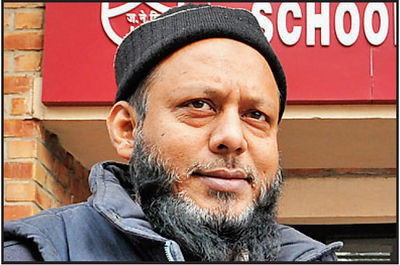
New Delhi :
He has prayed in synagogues and observed the Sabbath, Judaism’s day of rest, and enjoyed crispy falafel on the streets of Jerusalem. A map of Israel hangs in his study where Yasser Arafat shares space with David Ben-Gurion. And he doesn’t mind if his 10-year-old daughter greets him with ‘Shalom’ instead of ‘Assalam Alaikum’. Meet Dr Khurshid Imam, a devout Muslim and the only teacher of Hebrew at a university in India, Jawaharlal Nehru University.
The bearded, skull cap-donning Imam hopes for a new dawn in India-Israel ties, which received a boost with foreign minister Sushma Swaraj’s West Asia visit last week. Unlike most Muslims who look upon Jews with suspicion – just as most Jews don’t trust Muslims – this assistant professor of Hebrew at the Centre of Arabic and African Studies doesn’t harbour any animosity. And he wants to use Hebrew, the ancient language in which the sacred Torah was revealed, to bring Jews and Muslims closer.
The cause of animosities between Muslims and Jews is political. Religion is a pawn in the hands of politicians who don’t want adherents of the two Abrahamic religions cementing ties,” said Khurshid Imam, 46, whose unique distinction “baffles” many of his co-religionists brought up on a heavy dose of hatred for Jews.
“Many call me ‘Mossad agent’ among Indian Muslims, a Zionist promoter and some even jokingly call me ‘nek Yahudi’ (benevolent Jew) because of my passion for Hebrew,” laughs Imam, third among six siblings who grew up in Gopalganj, Bihar, and went to Hebrew University of Jerusalem in 1998. He stayed there till 2000 post-M Phil at JNU.
“Government of Israel scholarship and Golda Meir scholarship funded my courses in Hebrew and study of the Modern Middle East,” he said. “I wanted to learn Hebrew to understand Judaism and find commonalities between Islam and Judaism.”
He also wanted to conform to a hadith (tradition) of Prophet Muhammad, who is believed to have asked some of his companions to learn Hebrew. “If the Prophet encouraged Muslims to learn Hebrew, who are clerics and community leaders to issue fatwa against those who visit Israel?” he asked.
Despite apprehensions of friends and family, Imam chose to stay amid Jewish students who he discovered were not as “rabidly anti-Muslim” as many paint them to be.
“Many Jews first thought I was a non-Arab Muslim jihadist plotting to bomb their establishments. Similarly, Arab Muslims in Israel and Palestine mistook me for a Zionist disguised as a practising Muslim. Once, some kids even threw stones at me, shouting, “Yahud, Yahud” (Jew, Jew). I was moved when several Jewish friends wept when I left Jerusalem,” recalled Imam.
He is, however, disappointed by the “cold” response from several Indian universities to his proposal for teaching Hebrew. “Khurshid’s efforts are laudable and I believe Indian universities should open their doors to Hebrew because languages help build bridges between people,” said S A Rahman, retired professor of Arabic who mentored Imam at JNU.
source: http://www.timesofindia.indiatimes.com / The Times of India / News Home> India / by Mohammed Wajihuddin / TNN / January 24th, 2016
Pune, MAHARASHTRA :
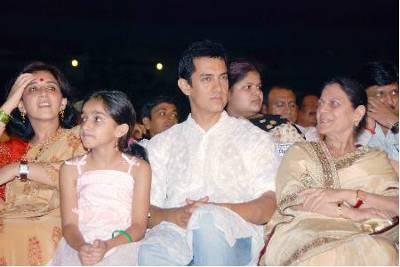
For her elder sister Nikhat’s 50th birthday, Aamir Khan gifted her five speeches of Moulana Abul Kalam Azad.
Aamir Khan’s sister, Nikhat celebrated her 50th birthday on Saturday and the entire Khan-daan was in Pune celebrating her birthday with lot of fanfare.
Aamir Khan had been thinking since a really long time of a special birthday gift for his sister. The entire family had been pitching in ideas for gifts to give to Nikhat. Everyone in the family had given him several options.
However, our perfectionist Khan wanted to look for the most perfect birthday gift for his sister. He especially wanted the gift to be extremely special, as it was Nikhat’s 50th birthday.
After a long brainstorming session Aamir Khan did the unbelievable. “He sourced and got the copy of five speeches of Maulana Abul Kalam Azad, the great Indian freedom fighter and Aamir Khan’s great grand uncle”, says a source. “At the get-together in Pune, everyone in the family heard all the speeches together and was teary eyed at the end of the session”.
“As it was much before their time and way back in history, no one from the family had ever heard Maulana Abul Kalam Azad’s voice ever before including Aamir, his sisters, bothers and cousins”, adds the source.
Aamir Khan and Kiran’s son Azad Rao Khan has been named after Maulana Abul Kalam Azad.
2012 has been Aamir Khan’s busiest year ever. Aamir is known for doing one project at a time. This is the first time in his career that he has been juggling between his magnanimous TV show Satyamev Jayate, Talaash and Dhoom 3 all in the same breath. Hence Aamir Khan hasn’t been able to spend quality time with his family.
source: http://www.http://www.timesofindia.indiatimes.com / The Times of India / News> Entertainment> Hindi> Bollywood> News / TNN / August 07th, 2012